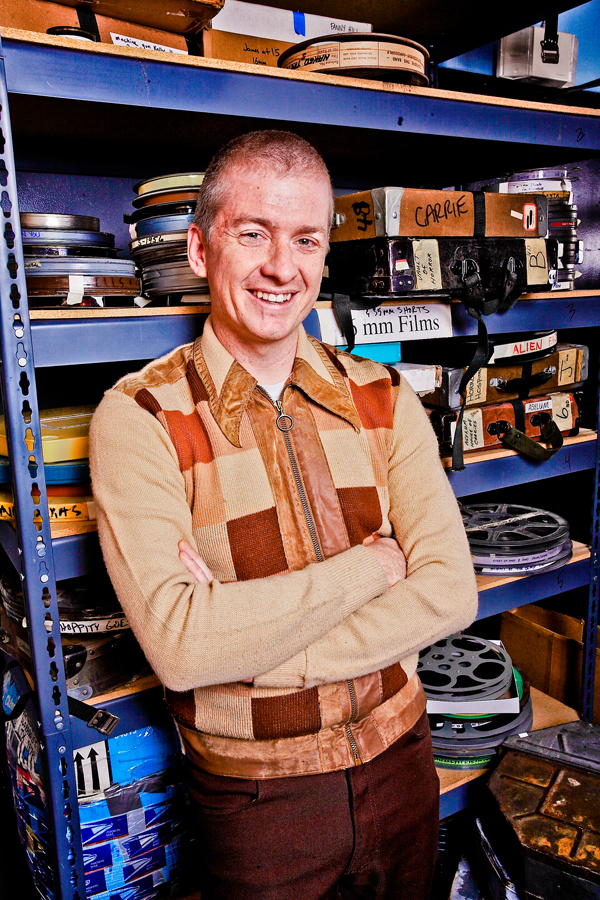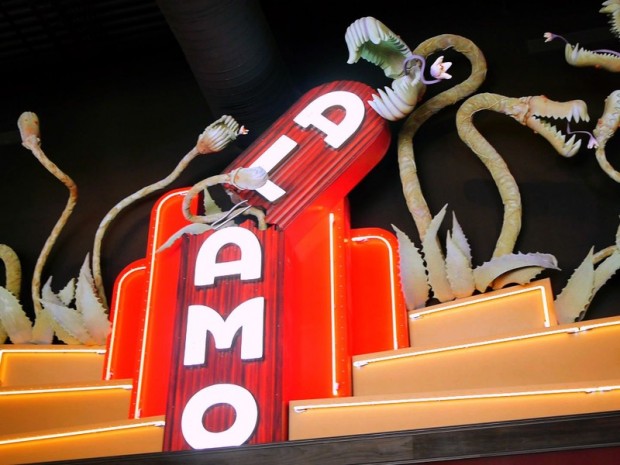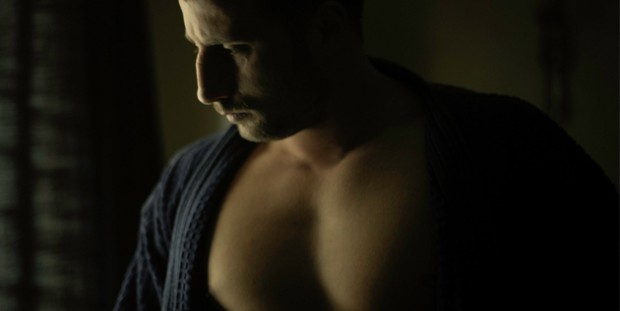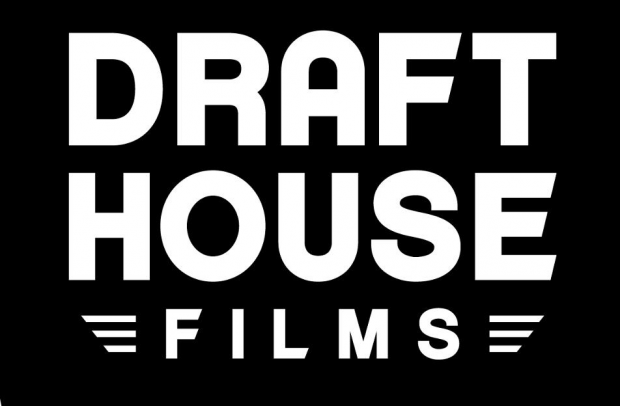
Fantastic Fest has slowly grown up over the years, but at the core the zaniness is still there. However, the business model has improved and each year as films sometimes go without any distribution theatrical or otherwise, Fantastic Fest and Alamo Drafthouse Cinemas co-founder Tim League has stepped in. Deciding to pursue distribution himself, he created Drafhouse Films, along with COO James Shapiro and Director of Aquisitions Evan Husney.
The company has already distributed films such as Four Lions, Bullhead and Klown, and see no reason to slow down now. I was able to sit down with the trio earlier this week during Fantastic Fest to discuss whether they ever see a 3,000-plus screen release in their future, how they are breaking out of the studio distribution mold, how much Fantastic Fest is a part of luring in filmmakers for Drafthouse Films, why League prefers small auditoriums and much more.
The Film Stage: You started Drafhouse Films and it seems like the key moment was when you reclaimed the former Drafthouses that were licensed, and now they’re all under one banner. Now you can distribute to those various theaters and are slowly but surely expanding to other markets.
Tim League: [Laughs] Right.
So, is there an idea of expanding to a three-thousand screen release or is it just going to be, “These are Drafthouse films”?
League: A three thousand screen release is pretty big. I don’t think that’s the realm that we’re playing in.
James Shapiro: That’s like eight-figure pay-and-play.
League: I think when we started this company we were all aligned to be finding films that are discovery films through a Fantastic Fest aesthetic. Inherently a lot of those are going to be much smaller releases. I can see us expanding to the next level of a tiered, traditional…
 Platform.
Platform.
League: Hundreds of theaters and then if it somehow it breaks out of the gate, being prepared to go higher. But I think inherently our content is challenging and therefore limiting in some ways to an audience like that.
Shapiro: And our distribution strategy on most of our titles — I mean, we’re not pigeon-holing all of our titles into one specific strategy — but if you go VOD first, you’re eliminating the ability to play in Regal and AMC unless you’re willing to four-wall like you’re seeing with Arbitrage right now. We just can’t afford, really, to play in that space.
I’m curious, because you mentioned VOD and it’s obviously something that a lot of the industry is taking advantage of. But is there any kind of concern? You mentioned right there that you can’t play in certain theaters if you do a VOD release before the theatrical.
Shapiro: Well, one of the big mantras I keep saying a lot about this company is that challenges are really opportunities for us, because you have these templates that the studios are set up with and we don’t have to follow those. We can operate with our own rules. It does limit the number of theaters we are going to be in, but it really opens the opportunity to do a lot of creative things distribution-wise, with digital and VOD, a lot of direct-to-consumer sales. There’s a lot of companies out there that want to work with us because we’re willing to do these things. We have really cool movies that they feel like they could promote themselves. That’s something that larger companies can’t do because they’re stuck in the old way of doing things. Whether they like it or not, it is going to be morphing more into what we’re trying to do. Again, it is a challenge, but that means it’s a huge opportunity for us as well.
Talking about the Alamo, and the South Lamar is the one I have the most experience with, most of your auditoriums are relatively small. Is that a factor of just attention to detail you can give to the individual patron or is it a matter of ‘we want to fit this many screens in this small of a space?’ I mean, you don’t have a thousand-seat auditorium or something like that.
League: I think our biggest screen is maybe 300 seats right now. It’s a complicated answer. The first part of it is honestly a logistics answer. You get a thousand people sitting at the exact same time, the kitchen is… you couldn’t imagine. We have the three highest-volume restaurants in Austin. So if you could imagine, we seat an 800-seat restaurant and then we seat it again at 9:45. So you can’t screw that up. So it’s mostly that. But I like maintaining a high seat-fill rate for theaters and it also allows us to play movies longer if they get traditional word of mouth. So if you have a 50-seat theater, and you’re getting 25 to 30 people, it’s great. You can run that for 12 weeks. If you have a 300-seat theater and you have 25 people in it, you have to get rid of it on Friday.
Fantastic Fest seems to be a huge labor of love for you. And labor maybe isn’t the best word. Maybe just love. Is this your favorite moment of the entire year?
League: [Quietly] Yes.
[Everyone laughs]
League: That’s why I put it together. Drafthouse Films is an extension of the aesthetics and the enthusiasm built around Fantastic Fest. Those are aesthetics that were built out of what we believe in at the Drafthouse. I conceptualized Fantastic Fest while on vacation at a similar festival in Europe. So it was like, ‘Oh my God, this is the greatest type of curation and this is what I need to do eventually whenever I have the time to do it.’
And you are going to be renovating the whole section, the South Lamar, the Highball. Is it a firm goal to be open for next Fantastic Fest and how nervous are you about that?
League: It’s not just a goal. It’s a mandate. It’s contractualized. So I’m not nervous about it because it’s going to happen. [Laughs] Things could always fall apart but we specifically structured the closure so that we could be back open in August and maybe early September before Fantastic Fest.

You were introducing Looper last night, and I was lucky enough to be in the theater for that. Great Q&A by the way.
League: Thanks.
You specifically mentioned how this is a hard-R film. It’s science fiction and a lot of studios are not going to be into that. You have the opportunity to basically say, ‘We’re going to pick it up. We’re going to distribute.’ Maybe not Looper, but films like this where they’re challenging to distribute for some studios or they’re challenging to produce, you have the ability to come in and say, ‘Hey, we got your back.’ Is it a lot of fun to be able to play in that realm where most of those studios would shy away and you’re saying, ‘That’s exactly what we want’?
Evan Husney: Yeah, I think that’s a part of our aquisition strategy. I think the films that we really get excited about are the ones that we have an immediate visceral reaction to. Sometimes those can be of a Fantastic Fest ilk. They’re a little harder edged. Whether they have a genre element to it or it’s just a comedy.
Like Klown.
Husney: Exactly, right. Or if it’s something that’s just a complete breathe of fresh air, a complete original vision. I think that’s something that really excites us. From the opening credits of a movie when there’s nice typography, when it’s layed out in a compelling way; things like that. When we start seeing someone with a clear vision, that’s sort of the first thing we’re looking for. It’s not necessarily who’s the cast or whether there’s a market for it specifically. But I think what we get excited about, first and foremost, is the film itself. So sometimes those are things operating outside of what’s appealing commercially to a larger entity. We look at what we have and the advantages and work that into our model and find the best distribution scenario for that particular film.

Is there a lot of negotation going on to where maybe you bring in a filmmaker and basically show them around and say, ‘This is what we do’? Or has Drafthouse Films and your Alamo Drafthouse Cinemas been big enough to where people know who you are?
Shapiro: We’re doing it right now, this week. Can’t say what film, but… yes. [Laughs]
League: And you can go back to last year. We didn’t know we were going to buy Klown or Bullhead. But the producer and director of Klown were here. The director of Bullhead was here. Klown won the audience award and Bullhead won every award. Those filmmakers saw what this company’s about and they were excited about the idea that we had an interest in it. So they could see the theatrical component. They could see the special attention to detail and care that were put into a release. So it made it a lot easier to start the negotiation after we have an ally in the creators who had visited during Fantastic Fest.
For Fantastic Fest, because you bring in so much filmmaking talent from outside the U.S, do you show international films that you might be able to distribute down the line?
League: Well, I think having relationships with directors was something that happened from year one. I’ll give you a case study in one particular path. In year one, we brought in Eugenio Mira for his film The Birthday. He had like the best time of his life. Everything about the festival, he just dove in and absorbed it. The very next year, his very good friend, Nacho Vigalondo, was looking to world premiere Timecrimes, and Eugenio told him all about the festival and Nacho came. And obviously Nacho had a good time [Note: he has been back nearly every year since, with a film or not]. [Laughs] The year after Nacho came, he went out immediately and told basically every Spanish filmmaker, ‘If you have a film, you have to come to Fantastic Fest. You really must go.’ So the next year we were innundated with Spanish directors.
[Everyone laughs]
League: That’s the kind of thing that’s happening. Hopefully the filmmakers come and have a good time, they tell their friends that this is a fun festival and that just develops this network of relationships between the label, the festival and directors.
So are you able to bring in a lot of people that you are potentially interested in? I mean, it almost sounds like a conflict of interest.
League: [Laughs]
That’s not what I’m hinting at.
League: Right.

But you know, you have the opportunity to bring in these people that don’t have distribution yet.
League: Well, this is also a festival where we also want buyers to come to the festival. We’re bringing them into an environment where there’s a lot of opportunities for them. So surely there’s elements of conflicts of interest in terms of having a festival and having a label. But ultimately my responsibility is to the director and producer: to find the best home for their film. So I have no problem whatsoever in just saying, ‘Bring it to the festival. Bring it out to the world. Talk to everybody. You should be comfortable with your decisions.’ I’m loyal to the director and producer, first. I want to encourage as much industry and press to also come to the festival so that the biggest range of opportunity is for anybody.
Shapiro: Just as an extension of that, I did acquisitions for a company before I worked here, that would come to this festival to buy things. Our model for that company is completely different from our model here. I think that most of the companies that come here do have different models than Drafthouse Films does. So, like, I would come as an Anchor Bay employee and I bought a movie called The Dead, which was a very successful release for Anchor Bay and I bought it after seeing it at this film festival. But that’s not a title that I think matches what we’re trying to do at Drafthouse Films. But it certainly matches what Anchor Bay is trying to do as a distribution company. So I don’t really see it as a conflict of interest. Having been now on both sides, I don’t feel like we have an advantage. I mean, we have an advantage for the films we’re trying to buy, but that is very different from most other companies. We are a very boutique, curated label. Most companies are trying to find films that they feel like they could exploit. But I don’t want to use that word as a negative word. But they are trying to get that movie out there to… make money. It’s not necessarily something that they passionately love the way that we passionately love films.
League: We’re out there to make money, too, just so you know.
[Everyone laughs]

Drafthouse Films is currently based in Austin and is planning to launch a New York City theater in 2013.

